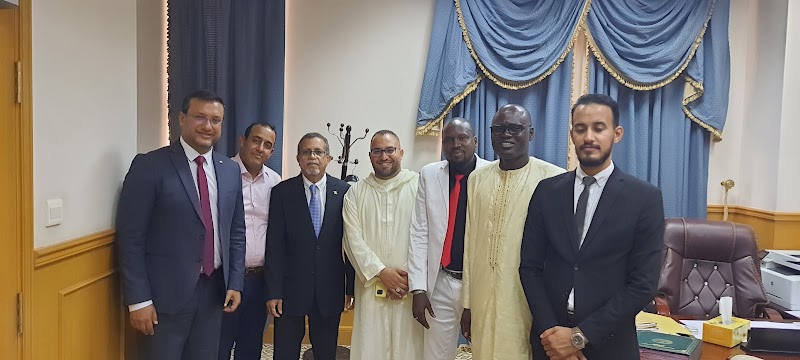Moktar Ould Daddah, a revered Mauritanian politician, holds the distinction of being the first President of Mauritania. Born on December 25, 1924, in Boutilimit, he hailed from a prominent Moorish family with a rich history in politics and scholarship.
Ould Daddah’s educational background laid the foundation for his future leadership. He completed his primary education in Saint-Louis, Senegal, and went on to pursue higher studies in France. His academic achievements earned him a law degree from the University of Paris and a diploma from the prestigious École Nationale de la France d’Outre-Mer (National School of Overseas France).
Prior to his presidency, Ould Daddah played a pivotal role in Mauritania’s struggle for independence from French colonial rule. As the Secretary-General of the Mauritanian Progressive Union (UPM), he spearheaded the political movement advocating for self-determination. His dedication and leadership qualities propelled him to the forefront of Mauritanian politics.
In 1960, Mauritania gained independence, and Ould Daddah became its first President. During his tenure, he embarked on ambitious nation-building initiatives. He focused on modernizing Mauritania’s infrastructure, developing its natural resources, and promoting economic growth. Under his leadership, the country made significant strides in education, healthcare, and social welfare.
- Achievements and Legacy:
- One-Party State: Ould Daddah established a one-party state, the Mauritanian People’s Party (PPM), which dominated the country’s politics.
- Focus on Infrastructure: He prioritized the development of Mauritania’s infrastructure, including roads, railways, and ports, to facilitate trade and economic growth.
- Natural Resource Exploitation: Ould Daddah oversaw the exploration and exploitation of Mauritania’s natural resources, such as iron ore, copper, and fish, which significantly boosted the country’s economy.
- Regional Influence: He played a prominent role in regional politics, advocating for African unity and promoting cooperation among neighboring countries.
Despite his achievements, Ould Daddah’s presidency was not without challenges. He faced internal dissent and opposition, as well as regional conflicts and border disputes. In 1978, a military coup led by Colonel Mustafa Ould Salek ended his rule, bringing about a new era in Mauritanian politics.
Ould Daddah’s legacy remains a subject of debate. Some hail him as a visionary leader who laid the groundwork for Mauritania’s development. Others criticize his authoritarian rule and his handling of political opposition. Nevertheless, his role as the first President of Mauritania and his contributions to the country’s early years remain significant.
Emblem of Mauritania
To enrich your insights into presidential figures worldwide, also explore some prominent first presidents from other countries, such as Marshall Islands, Malta and Mali. Delving into the leadership journeys of these figures can offer valuable perspectives on their historical significance and pivotal roles in shaping global politics.
The official residence and symbol of the Mauritania President
10 Iconic Presidents Who Shaped Mauritania’s History

Mauritania is a country located in Northwest Africa, known for its rich history and diverse culture. Throughout its history, Mauritania has had several presidents who have played a significant role in shaping the nation. Here are 10 of the most popular presidents from Mauritania:
- Moktar Ould Daddah: served as the first president of Mauritania from 1961 to 1978. He played a crucial role in the country’s independence and the establishment of its political system.
- Maawiya Ould Sid’Ahmed Taya: served as the president from 1984 to 2005. He implemented economic reforms and promoted stability during his tenure.
- Sidi Mohamed Ould Boubacar: served as the president from 2005 to 2007. He focused on democratization and improved relations with the international community.
- Mohamed Ould Abdel Aziz: served as the president from 2008 to 2019. He is known for his efforts to combat terrorism and his economic reforms to boost the country’s development.
- Ghazouani Mohamed Ould Cheikh: has been serving as the president since 2019. He has prioritized tackling corruption and improving economic stability.
- Hamdi Ould Mouknass: served as the president from 1980 to 1984. He implemented significant political and economic reforms during his short tenure.
- Valdi Ould Dadah: served as the interim president from 2009 to 2010. His focus was to facilitate the transition towards democracy and organize free and fair elections.
- Abdoul Aziz Abdallah Dahi: served as the interim president in 1984. He played a crucial role in stabilizing the country during a time of political uncertainty.
- Ahmed Ould Daddah: an influential political figure in Mauritania, he ran for the presidency multiple times and was instrumental in promoting democracy and human rights.
- Mohamed Mahmoud Ould Louly: served as the president from 1979 to 1980. He introduced political and economic reforms to modernize the country and improve the standard of living.

